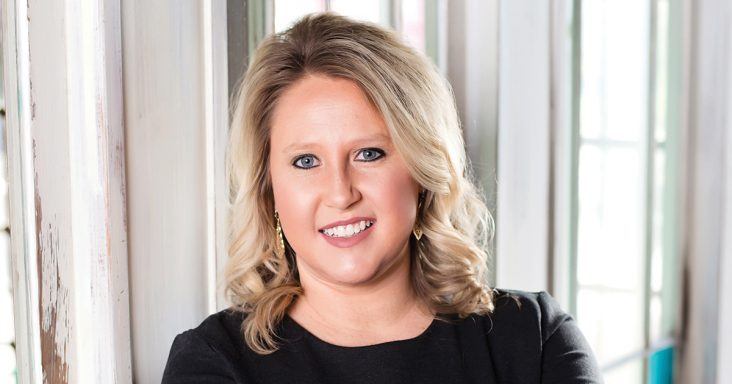Education push key for Batesville, Independence County economic future
by August 15, 2019 9:13 am 1,020 views

Batesville economic and political leadership has made a huge push in the past several years to invest more in education from pre-K to post-college.
Jamie Rayford, chief operating officer of the Batesville Area Chamber of Commerce, has been in the center of these significant changes. The chamber has created several organizations to drive different results and to pursue various agendas related to economic development, education and quality of life.
Rayford visited with Talk Business & Politics CEO Roby Brock on the uniqueness of Batesville’s efforts.
Roby Brock: Give me an overarching idea of why the Batesville chamber and the Independence County community put so much investment into education. It seems to me that it is much more coordinated than many other communities. What is driving this?
Jamie Rayford: We are a community with not just economic stability, but economic prosperity in mind. Leaders in our community compare the investment in education to that of buying versus renting a house. Most bases of industry and many businesses are facing a shortage of talent and skills, forcing them to hire, train, and repeat the cycle when the candidate is not work-ready, thus spending money and often retaining no asset or return on investment, in a sense they are renting their workforce.
Investing in a higher percentage of young residents’ education is an investment in the resident’s capacity to learn executive function skills and habits that are most desired in the workplace. This is a long-term investment strategy, such as buying a home. By laying a strong foundation we develop equity each year that a student is able to learn more along their path to career readiness.
Are we more coordinated than many other communities? I hope so. We work at this every single day, countywide. Just like an orchestra takes different groups working together to achieve harmony, so does workforce development and the Chamber has become the conductor of these important groups. We face the same obstacles that all of the other communities face as well – funding shortages, school choice, teacher shortages, etc., and the thing that we do differently, we always begin with listening, seeking to learn as much as we can as fast as we can, and almost always, immediately prescribe collaboration.
Brock: What are some initiatives that Independence County is undertaking that you think are unique?
Rayford: In a climate of funding and salary shortages, our Pre-K-12 schools are making smart investments, from tangible operations such as solar energy, to choosing only to invest money in educational curriculum and programs that add multidimensional value to a student’s diploma, and truly re-examining their educational process from elementary to graduation in order to implement a leadership culture teaching the seven habits of highly effective people as early as first grade.
They are all about data, not just end-of-year test scores, but many assessments and touchpoints throughout the year looking at individual student data, class data, and grade-level data. I am proud to say that many of my campuses have conversations around data from top level administration to classroom teachers multiple times a year, and some once a month.
Our districts all own the idea, through our Excel by Eight initiative in partnership with the Arkansas Grade Level Reading campaign, that early childhood education is one of the most important and most fragile opportunities we have to develop healthy brains and habits among our residents.
We know that prior to age eight is the greatest opportunity to teach focus, keeping track of things, prioritization, organizing and planning, effective management of time and timelines, adapting to the unexpected, problem solving, the ability to get along with others and work as a team, and keeping emotions under control so that one doesn’t get overwhelmed in the workplace. Coincidentally or not, the same skills our business leaders communicate as most needed.
Our institutions of higher education are collaborative and laser-focused on what our community, region, and state demands in the way of training and education.
Brock: Tell me more about the IMPACT Educational Excellence plan?
Rayford: We conducted a community survey in 2015 with more than 1,200 respondents. They said educational excellence was a top priority for the future of Independence County. Through an established grassroots planning sub-committee, focus groups, expert advisors, and one-on-one interviews, the educational excellence part of the plan was established.
Its goals are what dreams are made of: establish an educational foundation as a vehicle for philanthropy, equip our industry with a highly-trained labor force by building a state-of-the-art workforce development center, establish ourselves as leaders in K-12 education innovation in Arkansas, retain high school students at UACCB and Lyon College by establishing career pathways and an “Independence Promise,” expand existing quality infant and toddler childcare programs in the region, and increase county-wide access to broadband internet service.
Brock: You have a data-driven approach in that you are working off of a survey of the community for needs and desires. What is the data and feedback telling you?
Rayford: We always begin our processes with engaging the people in our community. We ask who cares about this? In our community, our residents gave us their top priorities through a community survey – and the top 25 of those were intertwined with one another in 4 main areas: economic prosperity, educational excellence, tourism development, and healthy living and well-being.
Our next step is always to examine our current reality. We use more quantitative data in this step where we are trying to understand what our position is in any certain area. Data in numerical form tells a story and we try to make sure that what our people are telling us and the patterns in the data match up. This helps us identify root causes and close gaps most accurately and effectively. Additionally, it gives us the baseline by which to compare future results.
